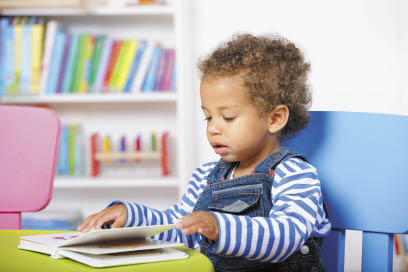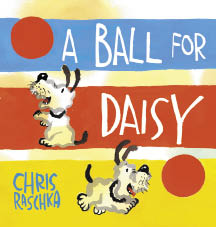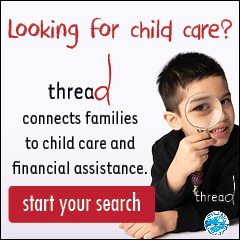
Raising a reader
What can you do to help your
child love books?
Story by Maia Nolan-Partnow
There’s no question that learning to read is an important milestone in a child’s life. Good reading skills help set children up for success, and children who read well are more likely to do well in school from an early age. But reading is also something many children struggle with, whether they have a hard time reading or just aren’t that interested in books.
We turned to the experts to find out what parents can do to raise little readers. Here’s what they recommend:
The early bird
Some parents put off reading until children are 2 or 3 years old, but even babies can benefit from being exposed to books, according to Barbara Brown, project manager for Best Beginnings in Anchorage.
“Even a child putting a book in their mouth or reaching for a book is an important developmental step,” Brown says. “Whether they’re responding to the fact that they’re being cuddled while they read, that it’s a quiet time, that it’s a very parent/child-centered time – whatever it is, all those things add up to a child learning to love books.”
For the youngest of tots (who have the shortest of attention spans), don’t feel that you have to actually read every word in the book. Flip the pages quickly, giving the gist of the story as you go.
Besieged by books
Children who grow up surrounded by books are more likely to enjoy them, says Angela Libal, manager of Title Wave Books in Anchorage. Additionally, studies have shown that there is a correlation between the number of books in a child’s home and success in school.
“I just tried to surround my kids with as much literature and as many books as I had when I was growing up,” Libal says. “Whether that was trips to Title Wave when they were younger or trips to the library, we’ve just always had books on hand.”
Read to your child
“Being read to creates such a great connection between parent and child,” says Emily Vockeroth, president of the board of the North Star Imagination Library, the Fairbanks branch of a national program through which children can sign up to receive an age-appropriate book each month until their fifth birthday. Even Vockeroth’s daughter, who’s just 2 years old, now looks forward to reading her monthly delivery with her mother.
Half the job of getting your children interested in reading is your effort, not theirs. Make it a priority to read to them regularly and continue to read to them as they grow older.
“I think just the action of turning off the television, tuning out the background noise and having a quiet moment – it becomes a ritual,” Libal says. “It’s a transition time when you need some down time – let all the other sensory things take a back burner and just sit and look at pictures with your young child or baby. Whether or not there’s even really a story, you’re pointing out things and looking to them to see what’s catching their interest.”
Just read – any time
“I think it’s really great to read at any time,” Vockeroth says. “Carry books in your purse. Read waiting in line at the grocery store, in the waiting room at the doctor’s office, in the bath tub, in the high chair. Don’t be afraid to go outside the box of lapsit reading time. There are a lot of other ways to read.”
And, she adds, you don’t have to read for a long time every time.
“Follow your child’s lead. You don’t have to read a book cover to cover,” Vockeroth says. “You can stop in the middle and switch books. You can read backwards from the last page. You can ignore the words on the page and just talk about the picture.”
“The best thing you can do to help a child be a reader is to talk to them,” Brown says. “The more words they have heard in their life, the more able they are to read. Get your child exposed to as many words as you can.” Children are more able to read words they recognize.
Embrace their interests
For kids who are reluctant readers, the problem might be that they’re just not interested in what they’re being given to read. Brown shared a story about a teacher who was having a hard time getting her own son excited about reading. Then she discovered a series of books about sports heroes. Before she knew it, her son was devouring them.
“When a child expresses an interest in something – for example, your child starts looking at bugs – I used to run to the library to get books on bugs,” Brown says. “If you can follow a child’s interest, they start seeing that the book is a place that answers their questions and matches what they’re interested in.”
As with so many other behaviors, children learn a lot about reading by watching their parents. Children who love books likely have an adult role model who loves books as well.
“If that child sees them reading, they’re picking up that this is an adult, valuable activity,” Brown says.










